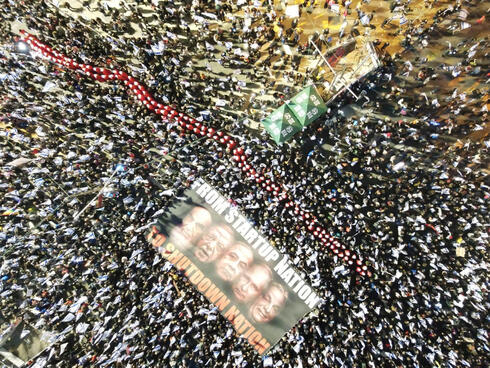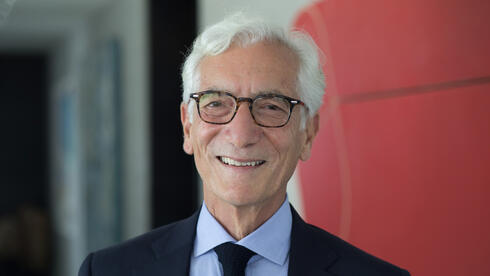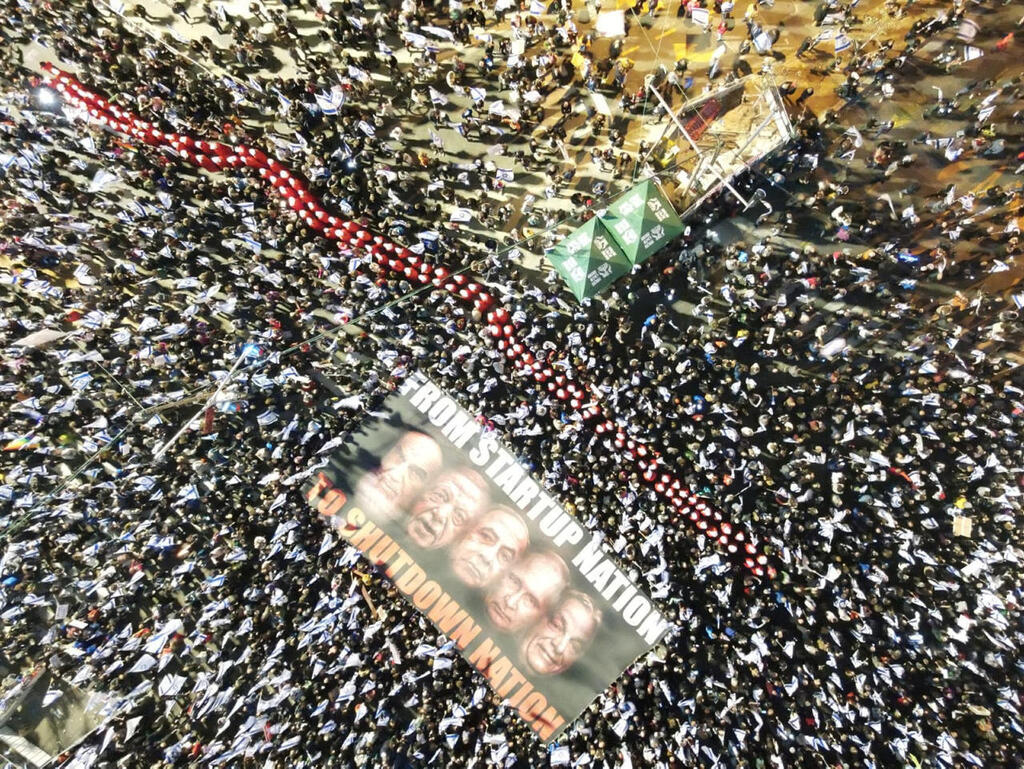
Analysis
8 key takeaways from Israel’s massive protest movement against the judicial overhaul
Moshe Gorali on what makes the protest movement powerful, its principles, how it expanded, and how Quentin Tarantino is connected
The protest movement against the government’s judicial overhaul will be studied in the history books, in Israel and around the world in the future, for many reasons: its diverse representation of Israeli society, bursting creativity, surprising scope, distributed power, and above all its longevity and persistence. It is a movement that breathed life into Amir Gilboa's poem, Song of the Morning, in which he writes “Suddenly a man wakes up in the morning, and he feels he is a people and he starts walking.” Our man feels that he is not just a people but also a democracy. He takes a flag, draws a sign, drives to Kaplan, to Horev Square in Haifa, to Karkur Junction and starts walking - to go and illuminate the horizon that his government seeks to darken.
1. Expanding goals
The protest is no longer focused only on judicial legislation. It is also responding to the additional 150 bills in support of a corrupt and Halachic state, which violate human rights and public decency. The protest movement prevented the dismissal of Defense Minister Yoav Gallant, and was outraged by the lies of a prime minister whose every speech would blow up any polygraph in his vicinity. The protests have become the watchdog of democracy, and are themselves a model of democracy: a federation of over 200 associations from all over Israeli society. This is a protest movement with no central command and is not managed from above, but is coordinated and makes information and means available to every protestor.
At this point, we still don't know what the end of this journey will look like. The achievements of the protest movement include delaying the legislation and preventing Gallant’s dismissal. Another achievement is the deterrence it has created for the Bibist-Kahnist government which, while they have not abandoned their dangerous goals, can no longer ignore the power that pours into the streets every week. This power recently also translated into polls that would crush Netanyahu and his party.
Israeli society is represented at all levels in these protests. It has Arabs and members of the LGBT community, religious Zionist Democrats, secular Jews, young people, doctors, nurses and social workers, musicians, poets and writers, as well as, as mentioned, over 200 associations.
It includes many creative initiatives such as free treatment for the mental health of the protestors, an emergency room for democracy in front of the Knesset, displays of the Declaration of Independence, the independence initiative document compiled by lawyers, and more. And within this diversity, three central divisions stand out that are well identified in the leadership of the protest: the women's division, the security division, and the economic division.
2. Women at the helm
The protest of the women in red is taken from the slave parade in the state of "Gilead" which is described in Margaret Atwood’s dystopian classic, "The Handmaid's Tale." Atwood portrays a futuristic U.S. ruled by a religious, extreme and extremely dark dictatorship.
The handmaids' protest highlights both the dictatorial nature of this government and the harm it is doing and seeks to do to women. It is in response to frightening initiatives by the coalition, such as punishing women who wear sleeveless tops at the Western Wall with half a year in prison, expanding the powers of the rabbinic courts, increasing the number of gender-segregated beaches, and exclusion from the public sphere. The illustration of the idea through the parade of handmaids in red was adopted and realized by Moran Zer Katzenstein and her organization, "Building an Alternative.” The image of the handmaids marching across the country has captured worldwide attention, including Atwood who responded warmly.
We don't have to reach a fully Halachic state like "Gilead," but a continuous surrender to the extremist partners in the coalition (the ultra-Orthodox parties and Religious Zionism received a combined 32 seats in the last election) will herald a deterioration of the democratic and liberal space. And those who will be the first to pay the price are minorities and the underprivileged who are not represented in government. The Arabs, LGBT community, progressives and women. It feels strange to talk about women as a minority or the underdog, but that will be their fate in Netanyahu's ultra-Orthodox dictatorship. The signs can already be seen in their underrepresentation in the government, and in talks about excluding them from the army and the public sphere.
Women play an important role in leading the protest. We will come to the role of Supreme Court President Esther Hayut and Attorney General Gali Baharav-Miara later, but the female energy in the protest is evident not only in the handmaids' parade but also on the stage in front of them. Shikma Bresler, Moran Zer Katzenstein, Orli Bar-Lev, Dina Zilber, Einat Guez, Suzie Navot are just some of the prominent voices.
3. The security forces: loyal to the kingdom, not the king
The security forces have stood at the head of the column of the protests. Volunteers and reservists, pilots, special forces, the Shin Bet, navy, artillery, paratroopers, and bereaved parents. Notable speakers at the protests have included defense ministers, chiefs of staff and generals such as Ehud Barak, Moshe Ya'alon, Dan Halutz, Amos Malka, Amir Eshel, and Matan Vilnai. The pilots and graduates of special forces units are among its prominent faces.
The government has tried to label the protests as "elitist" and "left-wing" - two of the most derogatory terms they and their supporters use. The problem is that the wide participation of the security establishment in the protests forces them to accept that the fist that they are so eager to swing at our enemies - from Iran to Gaza and Lebanon - is wielded by those "elite leftists." And beside them march members of every branch of the Israeli security forces, making it clear that there is no left or right but the supporters of democracy and the supporters of the coup. Even Netanyahu, should he choose to make war, knows which side he will choose - and it will not be the side that includes La Familia thugs, despite their proven ability to hit the enemy, that is, any Arab taxi driver who accidentally happens to be in their vicinity.
The security specialists bring skills from their service: spirit, determination, consistency as well as creativity and intelligence that allow flexibility, and ability to improvise. Sometimes they even seem to enjoy the event. Israeli militarism, it turns out, continues to pulsate in civil society, but expands loyalty: not only to the flag and the country, but also to democracy, to the anthem which states that "to be a free nation in our land," to the Declaration of Independence, whose text until yesterday no one really knew. It is good to die for our democratic country, they say, for the kingdom but not for the king.
And death will soon merge with the protest. Yom Hazikaron is approaching and with it the question of how the government ministers will be received at memorial ceremonies in the military cemeteries. In Be'er Sheva there was opposition to the appearance of MK Itamar Ben-Gvir. He will not eulogize the dead. The government will claim that politics should not mix with such ceremonies. Oh, like last year? When a Likud protester interrupted and screamed at the event during the speech of former Prime Minister Naftali Bennett? This year the cry is also in the name of the fallen who gave their lives for the Jewish-democratic state.
4. Tech representation
The role of economics in the protest is to emphasize the correlation between the collapse of democracy and the collapse of the economy. The economy deteriorates under dictatorships and flourishes in democracies. Investors and entrepreneurs need an independent legal system that knows how to determine disputes between the state and the individual, between international companies and domestic companies, between domestic companies and the government. A judicial system - judges, ombudsmen, regulators - appointed and committed to the government will raise the risk premium, drive away investors, capital and companies. The shekel will weaken, whole interest rates and the cost of living will rise, and set fire to the whole economy. This is especially concerning for Israel which has no natural resources, and whose wealth is derived from the minds of the creators of the Start-up Nation.
This protest started with the tech sector, and was soon joined by support from leading economists and the head of the Bank of Israel. They all came together to ring the alarm bells. The combination of security and economy that is the basis for the national strength of the State of Israel is now pitted against the Israeli government. Those responsible for GDP, exports, technological and security superiority are marching in Kaplan and other protest centers to save the country and themselves. Because they want to continue to succeed, and they want to do it here.
5. A new constitution
The protest movement is not represented in the discussions at the President’s Residence as it is not interested in joining a political event due to the lack of transparency, suspicion that they are talking about details before principles, and mainly in order not to rupture the protest by improperly representing all the groups that it is composed of.
However, there is still communication between the protest movement and the president's residence through professors Yaniv Roznai and Amichai Cohen who are there to advise and ensure that essential democratic principles are preserved. Chief among these principles are legal independence (including appointments), enshrined power of judicial review and human rights.
Shikma Bresler, one of the protests’ most important leaders, has emphasized the importance of keeping our eye on the ball - which is the judicial selection committee. After all, while countries such as the former Soviet Union and various Latin American dictatorships in the 1980s possessed beautiful constitutions, they were not worth the paper they were printed on because judicial appointments were controlled by the government.
A team of lawyers and legal scholars including Dina Zilber and Gilead Sher have drafted a constitution entitled "the Independence Initiative,” to present an alternative proposition to the coalition’s vision representing the protest movement and the liberal-democratic camp. It includes ten principles of a constitution that enshrine, among other things, the rule of law, the independence of the judiciary and key human rights such as equality and freedom of expression. Section 10 of the document states: "All parts of society will contribute to the security of the State of Israel, its economy, its well-being, and its prosperity." The question of whether the ultra-Orthodox will sign this document is of course rhetorical.
6. The periphery returns to the stage
The protest is struggling with something else: shirking the government’s attempt to characterize it as a homogenous movement - left-wing, elitist, from the center of the country, first-class citizens. However, this has been, in part, thwarted by the representation of the protests from other regions and sectors of the country. Last Saturday, Dr. Meirav Aharon Gutman, a professor at the Technion of Mizrachi descent from the northern city of Kiryat Shmona, spoke at the Tel Aviv protest, saying, "You are comfortable with us as second-class citizens," speaking to the government, "You are comfortable with our loyalty. Our pain is your fuel. We, who grew up in Kiryat Shmona will not give you our pain anymore. I came here today to break this damned covenant. A covenant in which only you benefit."
Aharon Gutman also criticized long-time neglect for the north and the periphery in general, saying: "For years there has been talk of record tension in the north. [The right-wing] have been in power for 12 years - did they protect you? The mayors discovered to their amazement that in 2023 the defense budget was cut significantly! On the morning of the Passover holiday, you got up to the Katyusha barrage, and our elderly, the residents of the old neighborhoods have no way to get out.
“We know that an earthquake is only a matter of time. In your 12 years in power in the Ministries of Finance and the Interior, you created a national plan for earthquakes. And what do the community of city planners say about it? This program only works in areas where there is high demand - only in the center of the country! You, who sit in power in the name of our pain, have once again created a plan that enriches the center and abandons the periphery!"
7. The courts and the limits of power
Another achievement of the protest is the synergy it maintains with the gatekeepers of the rule of law. Prominent examples are the attorney general, Gali Baharav-Miara and her deputies. And not just the lawyers, but senior members of the security establishment who courageously point out the dangers posed by the "reform" to Israel's security. The spirit of protest strengthens not only the gatekeepers but also the Supreme Court, led by President Esther Hayut, for the dramatic moment may come when the government’s legislation is passed by the Knesset and submitted for review. The coalition is leading a campaign designed to break the spirit, independence and security of the High Court. The massive protest makes it clear to the judges that they are not alone in the battle.
Still, one should not rely on the president and the attorney general too much, for the simple reason that they abide by the limits of their power and act only within the framework outlined by the law and the court - in complete contrast to the ways of Netanyahu and his cronies.
8. And, finally, Tarantino
Quentin Tarantino is a venerated director, husband of Daniela Pick and resident of Tel Aviv. In his book "Once Upon a Time in Hollywood" he writes about a Wild West television series called Lancer. Caleb DeCoteau is the leader of a murderous gang of bandits that plots to take over the town of Royo del Oro and steal the property of a wealthy rancher named Murdoch Lancer. Tarantino writes: "Caleb's plan was simple. Conduct an experiment to test how much shit Murdoch and the citizens of Royo del Oro were willing to swallow. His experiments proved, one after another, that the appetite of this community is like a bottomless pit."
Now Tarantino lives in Tel Aviv, which, unlike Royo del Oro, is not ready to swallow even one gram of shit. Not a pit, but an iron wall without a hole - without a hole and without fear.














